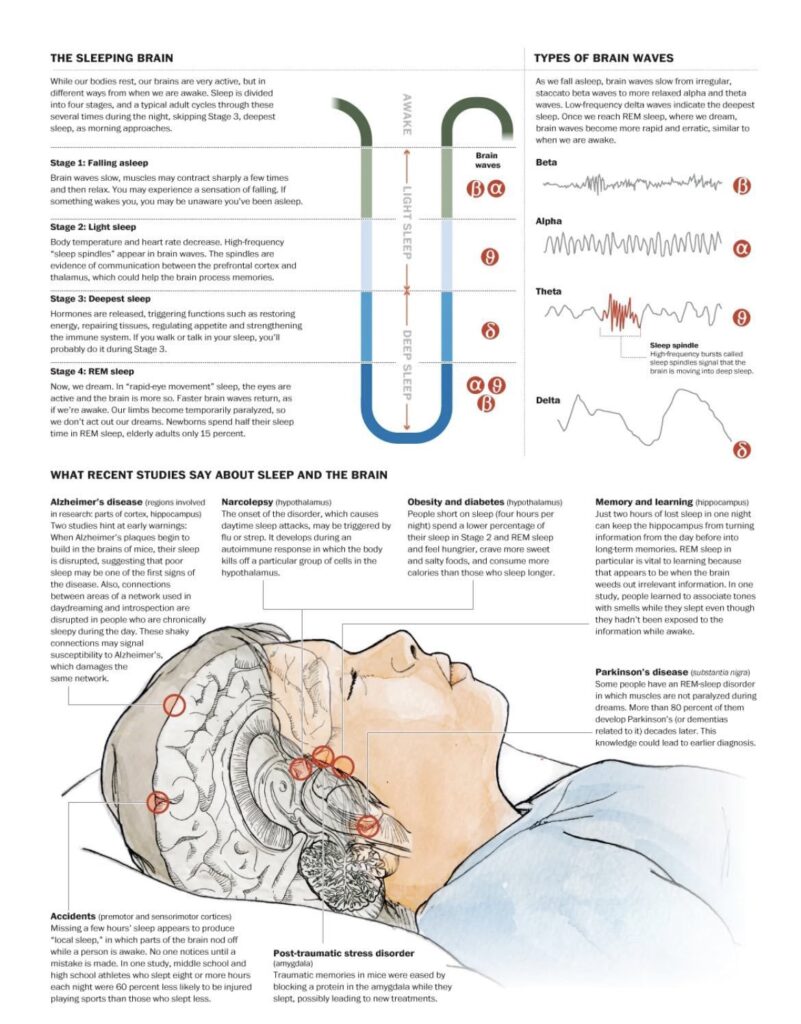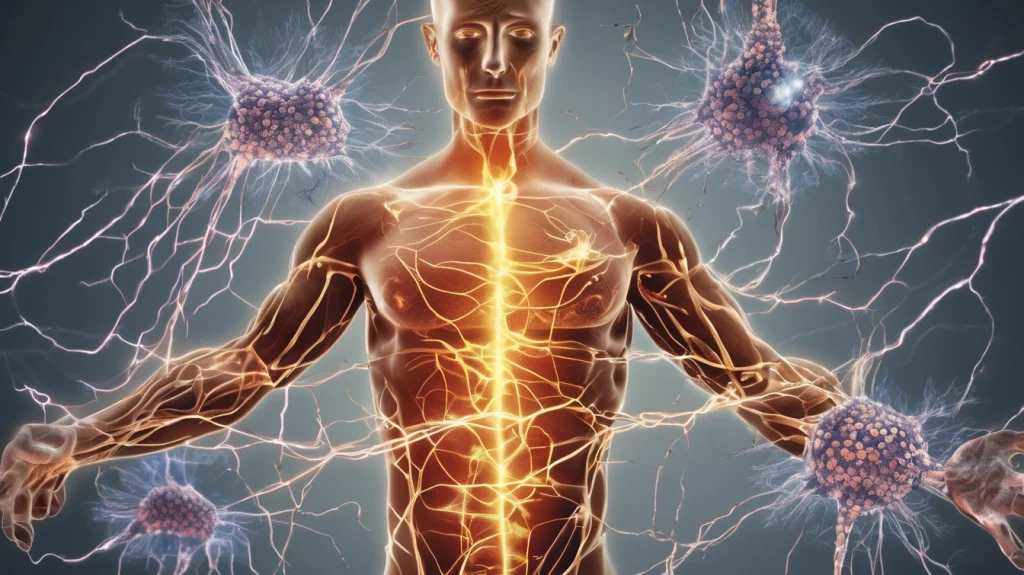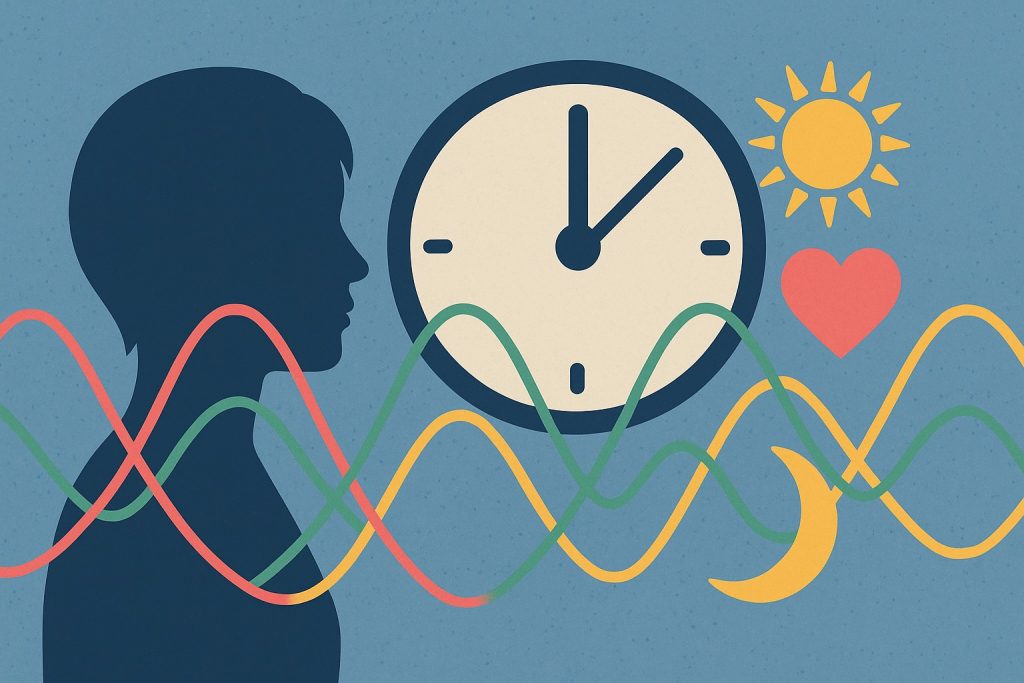While our bodies are resting, our brains are extremely active, but in different ways, depending on the phase of sleep. Sleep consists of several stages that an adult goes through multiple times a night, sleeping an average of 7 to 9 hours. Each of these stages plays a key role in maintaining our physical and mental health.
Stage 1: Falling asleep
- Description: In the first stage of falling asleep, brain waves slow down and our body begins to calm down. Muscles can contract rapidly and then relax, which can sometimes cause the sensation of falling.
- Brain waves: beta waves are dominant, slowly transitioning to alpha waves.
- Meaning: It is a transitional stage between wakefulness and sleep, in which we are easily awakened. It is crucial for preparing the body for the deeper phases of sleep.
Stage 2: Light sleep
- Description: At this stage, our body begins to enter a deeper sleep. Body temperature and heart rate begin to fall. There are so-called “new” developments. sleep spindles, or short bursts of brain activity that help in the process of memory consolidation.
- Brain waves: Transition from alpha waves to theta waves.
- Meaning: This stage is crucial for sleep stabilization and bridges the gap between superficial sleep and deep sleep.
Stage 3: Deep sleep
- Description: This is the stage of deepest sleep, also known as delta sleep. During this time, the body undergoes regenerative processes: rebuilding tissues, strengthening the immune system, and regulating hormones.
- Brain waves: delta waves predominate.
- Significance: Deep sleep is essential for physical recovery of the body and strengthening the immune system. Without the right amount of deep sleep, we can feel exhausted and unable to concentrate.
Stage 4: REM (Rapid Eye Movement).
- Description: In this phase, our eyes move rapidly under closed eyelids, and brain activity is very high, similar to that in the waking state. Still, our muscles are temporarily paralyzed, preventing us from physically responding to dreams.
- Brain waves: Beta and gamma waves appear, similar to those that occur in the waking state.
- Significance: REM is crucial for cognitive processes such as learning and memory. In this phase, memories and information acquired during the day are processed.
Types of brain waves
- Beta: Active during wakefulness and during REM sleep. They are characterized by high frequency and are associated with cognitive activity.
- Alpha: They occur during a state of relaxation, just before falling asleep.
- Theta: Dominant in light sleep, it is associated with relaxation and meditation.
- Delta: Characterized by deep sleep, they are the slowest and have the highest amplitude.
Latest research on sleep and the brain
Alzheimer’s disease (affected areas: prefrontal cortex, hippocampus)
- Description: Studies have shown that sleep disorders may be one of the early symptoms of Alzheimer’s disease. Reduced sleep quality affects areas of the brain responsible for memory and learning, which can accelerate the development of the disease.
- Significance: Early detection of sleep problems can help diagnose Alzheimer’s and other forms of dementia at an earlier stage.
Accidents (motor and somatosensory cortex)
- Description: Lack of sleep can lead to microsleep, or brief episodes of unconsciousness that can occur during the day. This increases the risk of accidents, both at work and in traffic.
- Importance: Getting the right amount of sleep is crucial for safety and productivity in daily life.
Post-traumatic stress disorder (amygdala)
- Description: Research indicates that sleep may play a role in processing traumatic memories. Disruptions in the REM phase can impede this processing, leading to an increase in PTSD symptoms.
- Significance: Therapies that focus on improving sleep quality can help treat PTSD.
Narcolepsy (hypothalamus)
- Description: Narcolepsy is a disorder characterized by sudden daytime sleep attacks that are caused by a lack of specific neurons in the hypothalamus.
- Significance: A better understanding of the mechanisms of narcolepsy could lead to more effective therapies and drugs.
Obesity and diabetes (hypothalamus)
- Description: People who sleep less than 4 hours a night have reduced time in the REM phase, which affects the regulation of hunger and appetite. Lack of sleep leads to increased levels of hormones responsible for hunger, which can contribute to obesity and diabetes.
- Importance: Getting enough sleep can be an important part of the prevention and treatment of obesity and diabetes.
Memory and learning (hippocampus)
- Description: Sleep, especially the REM phase, is crucial for memory processes. During sleep, the brain consolidates memories and processes information acquired during the day.
- Importance: Adequate sleep is crucial for effective learning and remembering new information.
Parkinson’s disease (black substance)
- Description: Some people with Parkinson’s disease develop REM sleep disorders years before other symptoms appear. This can be an early indicator of a developing disease.
- Significance: Early recognition of sleep disorders can help earlier diagnosis and treatment of Parkinson’s disease.
Summary
Sleep is a key component of brain and body health. Its disorders can lead to serious health problems such as Alzheimer’s disease, narcolepsy, obesity, diabetes, PTSD and Parkinson’s disease. Sleep research is providing increasing evidence of the importance of rest for brain function and overall health. Let’s take care of the quality of our sleep to ensure better health and well-being.





